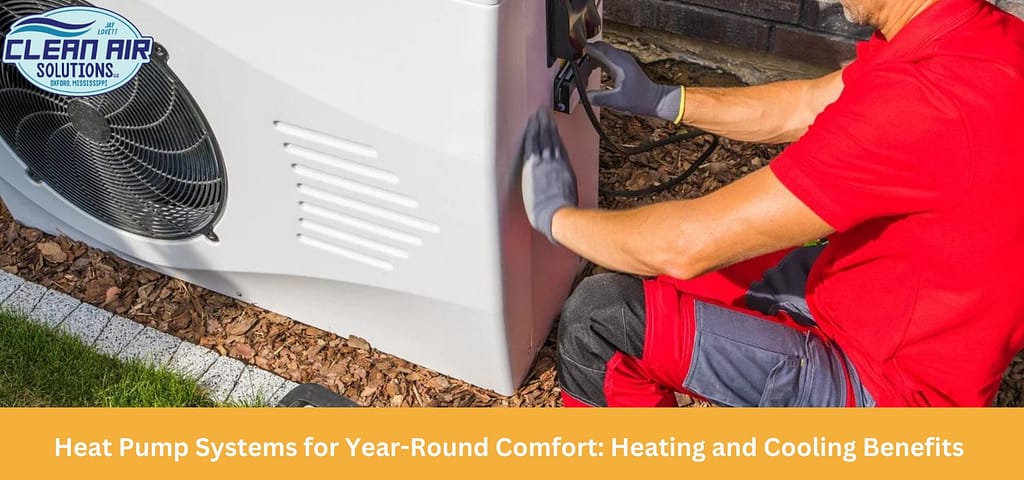
Finding a reliable and efficient way to keep your home comfortable throughout the year can be a challenge. Enter heat pump systems, the versatile solution that adapts to seasonal changes, providing both warmth in the winter and cool air in the summer. These innovative systems leverage advanced technology to transfer heat, making them a smart choice for homeowners seeking energy efficiency without sacrificing comfort. In this article, we’ll delve into the numerous benefits of heat pump systems, how they function, and why they are the ideal solution for year-round comfort.
What is a Heat Pump System?
A heat pump system is an HVAC (Heating, Ventilation, and Air Conditioning) solution that transfers heat from one place to another. In winter, it extracts heat from the outside air and transfers it indoors, providing warmth. Conversely, in the summer, the heat pump reverses the process by extracting heat from your home and releasing it outside, functioning like an air conditioner. This dual functionality is what makes heat pump systems highly desirable for homeowners looking to achieve year-round comfort.
Types of Heat Pump Systems
There are several types of heat pump systems available on the market, each designed to meet different needs and preferences:
- Air Source Heat Pumps: The most common type, air source heat pumps extract heat from the outdoor air. They are relatively easy to install and can be used in a variety of climates.
- Ground Source Heat Pumps (Geothermal): These systems use the constant temperature of the ground to heat and cool your home. While they are more expensive to install, they are highly efficient and can save you money in the long run.
- Ductless Mini-Split Heat Pumps: Ideal for homes without ductwork, these systems consist of an outdoor compressor and one or more indoor air-handling units. They allow for zoned heating and cooling, providing flexibility and efficiency.
How Heat Pump Systems Work
Heat pump systems operate on a principle called refrigeration. This process involves a refrigerant that circulates through a series of coils and is responsible for transferring heat. Here’s a simplified breakdown of how heat pumps work:
- Heating Mode:
- The heat pump extracts heat from the outdoor air, even when temperatures are low.
- The refrigerant absorbs this heat and is compressed, raising its temperature.
- The heated refrigerant is then circulated through indoor coils, where it releases heat into your home.
- Cooling Mode:
- The process is reversed during warmer months.
- The refrigerant absorbs heat from inside your home and carries it outdoors.
- This effectively cools your living space, similar to how an air conditioner operates.
The Refrigeration Cycle
Understanding the refrigeration cycle is key to grasping how heat pumps function. This cycle includes four main components: the evaporator, compressor, condenser, and expansion valve.
- Evaporator: In the heating mode, the evaporator coil absorbs heat from the outside air. The refrigerant evaporates, turning into a gas as it absorbs heat.
- Compressor: The compressor increases the pressure of the gaseous refrigerant, which raises its temperature.
- Condenser: The hot, high-pressure gas moves to the condenser coil, where it releases heat to the indoor environment and condenses back into a liquid.
- Expansion Valve: The refrigerant then passes through an expansion valve, reducing its pressure and temperature before returning to the evaporator to restart the cycle.
This efficient transfer of heat allows heat pump systems to maintain a comfortable indoor climate all year long.
Benefits of Using a Heat Pump System
1. Energy Efficiency
Heat pump systems are known for their energy efficiency. Unlike traditional heating systems that generate heat, heat pumps simply move it from one place to another. This process requires significantly less energy, resulting in lower utility bills. Many models have high SEER (Seasonal Energy Efficiency Ratio) and HSPF (Heating Seasonal Performance Factor) ratings, making them an environmentally friendly option.
2. Dual Functionality
One of the most significant advantages of a heat pump system is its ability to both heat and cool your home. This dual functionality means that homeowners can enjoy year-round comfort without needing to invest in separate heating and cooling systems. This not only saves money on equipment but also reduces maintenance and installation costs.
3. Space-Saving Design
Heat pump systems are compact and can be installed in various locations, including indoors and outdoors. This flexibility makes them an ideal choice for homes with limited space. Unlike bulky traditional heating systems, a heat pump can easily fit into tight areas, allowing for better use of space in your home.
4. Improved Indoor Air Quality
Modern heat pump systems often come with advanced filtration systems that help improve indoor air quality. These filters trap dust, allergens, and pollutants, ensuring that the air you breathe is cleaner and healthier. Improved air quality can lead to better health outcomes, especially for individuals with allergies or respiratory issues.
5. Low Maintenance Requirements
Compared to traditional HVAC systems, heat pumps typically require less maintenance. Regular checks and filter changes can keep the system running smoothly without the need for extensive repairs. It’s still important to have your system serviced by a qualified HVAC contractor at least once a year to ensure optimal performance.
6. Environmental Impact
Heat pump systems have a smaller carbon footprint compared to traditional heating systems that rely on fossil fuels. By using electricity to transfer heat rather than generate it, heat pumps can significantly reduce greenhouse gas emissions, contributing to a more sustainable environment.
Choosing the Right Heat Pump System
When considering a heat pump system for your home, it’s essential to consult with an experienced HVAC contractor. They can help you assess your specific heating and cooling needs, recommend the appropriate size and model, and ensure proper installation. Proper sizing is crucial, as an undersized unit will struggle to maintain comfort, while an oversized unit may lead to increased energy costs.
Achieve Year-Round Comfort with Oxford’s Premier HVAC Contractor
Investing in a heat pump system is a smart choice for homeowners seeking efficient and versatile heating and cooling solutions. With energy-saving benefits, dual functionality, improved indoor air quality, and a reduced environmental impact, heat pumps can enhance your comfort all year round. If you’re considering a heat pump system for your home, Clean Air Solutions is here to help! As a trusted HVAC contractor in Oxford, MS, we specialize in installing and maintaining heat pump systems. Inquire today about how we can help you achieve the perfect indoor climate for your home!
Clean Air Solutions Oxford MS
Serving Oxford, Abbeville, Water Valley, Batesville, & Springdale, MS
(662) 816-9197
